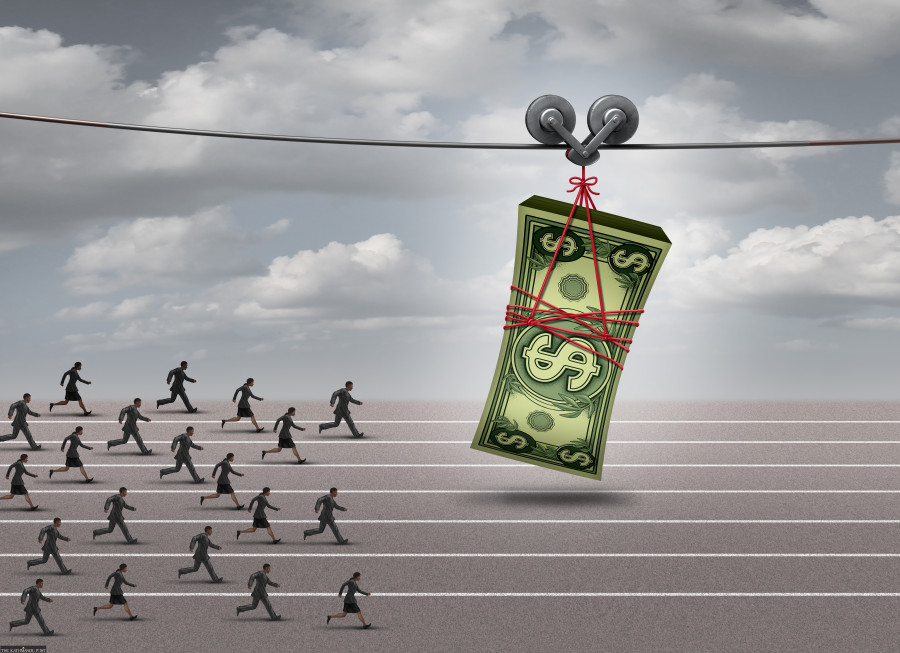Columns
The chase for money
The anxiety to sustain life and livelihood propels people to try and earn as much as they can for a modicum of security.
Avasna Pandey
A friend of mine who recently returned to Kathmandu after a seven-year stay in the United States lamented that the capital city he came back to was not the same he had left behind. The city, he said, was now colder in temperature and in spirit. He found the warmth that people had while conversing with each other in the olden days missing; instead, he found the people always thinking and talking about making money. I turned the conversation elsewhere after dropping just a "yeah" in response.
Having lived in America, a country that has mastered the art of quantifying human well-being, he must surely know a thing or two more about capitalist societies than I do. But this much I know—he was right on point. In most metropolises these days, people are running after money. This goes contrary to the traditional global fetish of representing the Nepalis as the materialistically unambitious people from the land of Shangri-La, Buddha and Mt Everest. How, then, did money start to become the central concern of our lives? A large part of the answer lies in the fact about how we are governed.
Land prices
We are increasingly being pushed into the money-making enterprise, often finding ways to work two jobs, to save a bit for ourselves. Why is that so? That is because we can hardly rely on the government to take care even of our petty problems, forget about bigger ones. There is no assurance from those we have chosen to represent us that they are really working for us and are concerned about our future. Healthcare, education, shelter–nothing comes cheap nowadays. The case of bad governance and poor service delivery plagues the entire country; but Kathmandu, the capital city, is at its worst, with rent and land prices hitting the roof. Since the citizenry is largely left to be on their own, the anxiety propels people to try and earn as much as they can for a modicum of security.
As former UN secretary-general Kofi Annan argued, "Good governance is ensuring respect for human rights and the rule of law; strengthening democracy; promoting transparency and capacity in public administration." Simply put, as long as governments and governing bodies take on the responsibility to meet the needs of the masses rather than a selected few, there is some semblance of good governance. In our case, all of the above seem to be in short supply. There is hardly any respect for the rule of law as people with more money are progressively acting with impunity; leaders want their critics silenced, and with Nepal’s position sliding in global corruption perception indexes, promoting transparency and capacity in public administration seems like a pipedream. No wonder, young people aspire to earn loads of money.
During the Maoist insurgency, many people relocated to Kathmandu as other places were comparatively more vulnerable to attacks. By the time the conflict was over in the latter half of the 2000s, land prices in Kathmandu had already begun to soar owing to high demand. During the 10 years of the insurgency, the Maoists looted billions in cash, gold, silver and other valuables. But after the peace accord was signed and the insurgents entered mainstream politics, they began injecting their wealth in real estate, among other things. As the state paid little attention to the unrestrained spike in change of hands in real estate, land prices in Kathmandu increased by a staggering 300 percent between 2003 and 2008.
Investing in real estate remains lucrative to this day. In many developed countries, better regulated markets enable people to buy a house or a flat with a monthly instalment. But in Kathmandu and other urban centres, the land market is yet to be regulated, and so renting or buying a house continues to be prohibitive. According to the latest household survey by the Central Bureau of Statistics, urban households spend about 45 percent of their income on food and 18.7 percent on rent alone. With real estate, the government presented a textbook lesson in misgovernance.
Parliament provides no salvation either. While the House was dissolved twice, two years before its tenure ended, the Supreme Court had to step in to correct the unconstitutional step and reinstate the legislature. But the opposition UML has been obstructing Parliament since September 2021. According to reports, there are 56 bills pending in the two Houses of Parliament—41 in the lower house and 15 in the National Assembly. Except for the Millennium Challenge Corporation (MCC) Compact that was passed after much kerfuffle on February 27, no other bills have seen progress. Parliament forms the bedrock of representational democracies, and it is where the members discuss government policy, propose new laws and talk about topical issues of the day. But in our case, lawmakers barely feel the urgency to do so. For politicians who have sworn to serve the people, the biggest opportunity they can have in their career is to do something deeply structural that proves transformative for the public. Parliament is a place to do that, but elected representatives deliberately miss out on that.
Society is shaped by multiple stakeholders—political parties, universities, media, friends, families and so on. But thanks to an enduring state of misgovernance, the citizenry has lost trust in these stakeholders, making them increasingly insecure. The insecurity has propelled people to aspire for growth, but the focus has been on monetised growth. Human betterment has become a secondary concern. But net worth cannot become synonymous with self-worth.
Rat race
There is a difference between being rich and being wealthy. Wealth manifests as food, shelter, resources, knowledge and meaningful experience. Being rich is the condition of possessing money, which only helps to move the wealth around. But our aspirational youth, who are regrettably running a rat race, have not had the time to think about it. There is money to be invested in company shares, 12-hour shifts to be completed, and taxes to be paid—all, to get nothing in return. We are struggling every day, and yet uncertainty looms large whether it will yield future returns.
The basic elements of society and life constitute growth, but it must be complemented by works of art, urban spaces, the pursuit of knowledge and the ability to live as a community and not as atomistic individuals. But unless systematic changes are made to ensure that such things translocate from the realm of luxury to the realm of daily experience, the citizenry will continue to be anxious and obsess over making money.




 13.12°C Kathmandu
13.12°C Kathmandu















